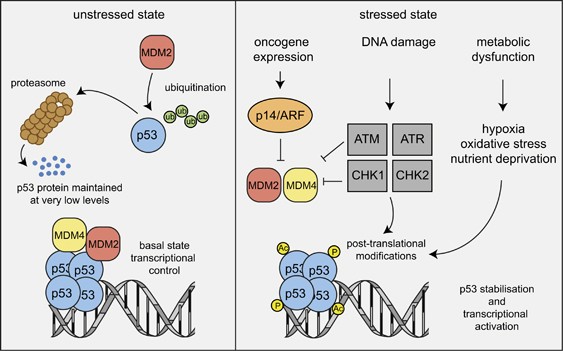P53 gene and Its Role in Apoptosis:
P53 gene is guardian of genome. Normally, DNA is replicating, special genes produces special protein, called proof reader. These protein studies DNA all the time. Ex: They make sure guanine matches with cytosine and adenosine match with cytosine.
When DNA gets damaged due to anti-cancer drugs, radiation, proof reader detects it and comes towards p53 gene.
P53 gene gets activated. These then activates another gene, which will produce the product that arrest cell cycle. They also activate DNA repair gene.
DNA repair gene produces enzymes which repairs DNA if possible. If damage is fixed, cell cycle continues. When damage to DNA can’t be repaired, proof reader constantly irritates p53 gene.
This results in overstimulation of p53 gene. These genes then produce special type of products which concentration becomes very high.
They start to act on anti-apoptotic gene and pro-apoptotic gene resulting in activation of pro-apoptotic gene and inhibition of anti-apoptotic gene.
Anti-apoptotic gene is downregulated and pro-apoptotic gene is upregulated.
This results in increased permeability of mitochondrial membrane through which cytochrome ‘c’ and AIF gets escaped into cytosol.
Cytochrome ‘c’ with some co-factors and AIF acts on caspases-9 (initiator caspases).
These caspases further activate series of caspases (executioner caspases).
Executioner caspases digest away cytoskeleton of cytoplasm, nucleus and activates endonuclease (DNAases). DNAases breaks down DNA and nucleoprotein.
Cell membrane gets altered and forms blebs around it which gets separated forming apoptotic bodies. These bodies are then phagocytosed by macrophages.
